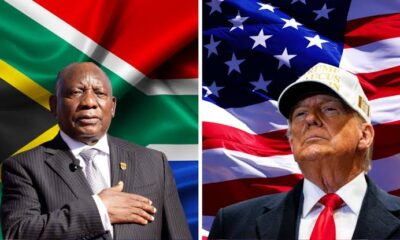Business
Washington Turns Up the Heat: Second US Bill Targets ANC and South Africa’s Trade Future

South Africa’s uneasy relationship with the United States has taken another sharp turn. A second bill has now been tabled in Washington, this time in the US Senate, calling for sanctions against ANC officials and pushing to remove South Africa from the African Growth and Opportunity Act (AGOA).
Two Bills, One Target
The legislation, known as the US–South Africa Bilateral Relations Review Act, was introduced on 15 September by Senator John Kennedy. It mirrors a bill already circulating in the House of Representatives, brought earlier this year by Congressman Ronnie Jackson.
Both bills share a common aim: to reassess US relations with Pretoria, impose sanctions on ANC members under the Global Magnitsky Act, and challenge South Africa’s trade benefits. But there is a key difference. Kennedy’s Senate bill goes further by explicitly demanding South Africa’s removal from AGOA.
AGOA has long been touted as a lifeline for South African exporters, granting preferential access to US markets. If stripped away, industries such as automotive, citrus, and wine would be among the hardest hit. Although some argue that former president Donald Trump’s tariffs already overshadow AGOA, the symbolism of being ejected from the programme would mark a significant diplomatic rupture.
What Sparked This Push?
Senator Kennedy did not mince his words. He accused the South African government of “cosying up” to Russia and China, making “antisemitic attacks” against Israel, and appointing what he called “radical officials.” His office pointed to the hosting of joint naval exercises with Russia and China, as well as the docking of a sanctioned Russian cargo ship on South African shores.
He also singled out former ambassador Ebrahim Rasool for once labelling Donald Trump a “supremacist.” For Kennedy, this added to what he described as a “chronically mismanaged” government undermining US national security interests.
From Showmanship to Seriousness
South African-born US political commentator Joel Pollak has warned that while many bills in Washington are tabled for show and quietly fade away, the existence of parallel versions in both the House and the Senate signals something more serious.
When legislation appears in both chambers, it is usually a sign of coordinated political momentum. Both Republicans and Democrats, he noted, have become increasingly disillusioned with South Africa. For Republicans, policies such as Black Economic Empowerment and land expropriation have been longstanding sore points. Democrats, meanwhile, are critical of Pretoria’s closeness to Russia, China, and Hamas.
The Kennedy and Jackson bills capture frustrations from both sides of the aisle. This raises the possibility of bipartisan support, something that could push the proposals further than previous attempts.
Will It Actually Pass?
Even with this renewed push, the process is far from straightforward. Both chambers of Congress must approve the same bill without amendments before it lands on the president’s desk. Past attempts have faltered along the way. A similar House bill in 2016 died once it reached the Senate.
This time, however, both the House and the Senate are under Republican control, and there are two versions of essentially the same bill in motion. Pollak described this as an “important sign” that lawmakers may be preparing for a real foreign policy shift, rather than a symbolic gesture.
A Turning Point in US–SA Relations?
For South Africa, the stakes are high. The ANC now faces not only the risk of sanctions against its officials but also the potential loss of a cornerstone trade deal. In Johannesburg’s financial circles, the talk is already turning to what this could mean for exports and investment confidence.
While nothing is guaranteed, one thing is clear: Washington’s patience with Pretoria is wearing thin. And if both bills make it further than their predecessors, South Africa could find itself grappling with consequences that extend well beyond party politics.
Also read: South Africa’s Plan to Cut Electricity Prices by 2026: What It Means for You
Follow Joburg ETC on Facebook, Twitter, TikT
For more News in Johannesburg, visit joburgetc.com
Source: Business Tech
Featured Image: BizNews



























